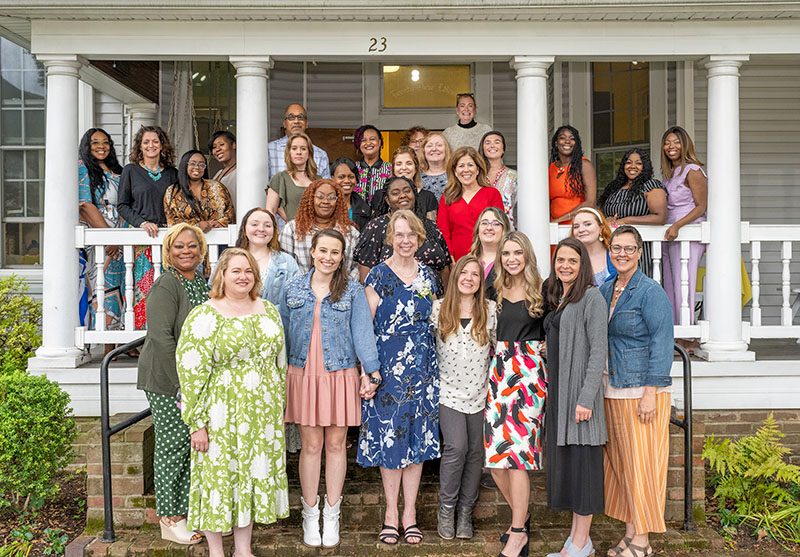
ABOUT US
Hope House
Mission: To improve the quality of life for individuals and families affected by HIV and poverty.
Vision: Hope House will be a catalyst for life-long change in the lives of those affected by HIV and poverty.
Hope House Daycare and Preschool
Open 8:00 a.m. – 3:30 p.m.
We follow the Shelby County Schools for all holidays and closures.
All Social Services are by appointment only.
Please reach out to your medical case manager for a referral.
Food Pantry hours are Monday, Tuesday, Wednesday, and Friday: 8:30 a.m. – 12:00 p.m.
Thursday: 8:30 a.m. – 12:00 p.m.
and 4:00-6:00 p.m.
Objectives:
• Provide early childhood education in a safe, loving environment to children infected or affected by HIV/AIDS.
• Prepare pre-school children for entry into kindergarten.
• Provide supportive social services to children and individuals affected by HIV and poverty in order to enhance the quality of their lives.
• Assist individuals in obtaining education and employment in order to remove them from dependency and to offer them a vision of economic choices for a fulfilling life.
• Collaborate with other community resources to ensure our children’s and adults’ needs are met.
• Educate the Memphis community about HIV/AIDS to prevent the disease from spreading and to eliminate the stigma associated with HIV/AIDS.

A History of Hope
2021
• Funding through the Ending the HIV Epidemic initiative allows Hope House to expand outreach throughout the community, providing additional HIV testing and medical care linkage.
2020
• Hope House becomes a licensed mental health center through the Tennessee Department of Mental Health and Substance Abuse.
• Hope House expands the preschool and daycare programs, growing them to capacity and enhancing therapeutic wrap around services for the families through a grant from the State of Tennessee Department of Human Services.
2018
• With a generous grant from Gilead Sciences, Hope House creates an outreach program to provide on-site therapeutic services in the community, free HIV testing and prevention education.
2017
• With a grant from the Office of Criminal Justice Programs, Hope House is able to provide services specifically for HIV-affected individuals who are victims of crime.
• A grant from Ryan White, Part B allows Hope House to provide emergency housing support for individuals living with HIV in Memphis.
2014
• Hope House becomes a Shelby County School partner.
2008
• Hope House receives its national accreditation from the National Association of Education of Young Children (NAEYC).
2006
• HIV disproportionately affects people of color who are living in poverty. The CDC reports that African Americans account for more than half of new HIV infections in the U.S.
• Hope House provides a housing program to help place homeless adults and families in safe, affordable housing.
2005
• 3rd house opens.
• We are able to provide full scale adult services.
• Play Therapy services begin and as a result have eliminated expulsions from the school due to behavior issues.
2001
• Hope House Preschool opens to meet growing demand for pre-kindergarten education options for children living in poverty.
• Worldwide 10 million young people aged 15-24 and almost 3 million children under 15 are living with HIV.
1999
• Hope House grew to serve 37 children, 5 days a week.
• Women now account for 23% of AIDS cases in the U.S., as opposed to only 7% in 1985.
1995
• By the end of this year, 500,000 cases of AIDS have been reported in the U.S.
• The property located at 23 S. Idlewild is purchased and renovated with the generous support of the Plough Foundation and the Assisi Foundation.
• A 15 passenger van is purchased. Hope House opens (8/5/95) 3 days a week with 5 children. Junior League President is Anne Curtis, who has served as a Hope House board member.
1994
• Junior League President is Lucia Crenshaw.
• AIDS becomes the leading cause of death for all Americans ages 25 to 44.
• Hope House holds its first Board of Directors’ meeting and incorporates. The Junior League group begins searching for a property to house the organization. With the help of former Senators Roscoe Dixon and Curtis Person, Hope House receives support from the state to help start services.
1993
• Two federally funded research studies, The Women’s Interagency HIV Study and HIV Epidemiology Study begin to study women and HIV/AIDS.
• A group of women from the Junior League of Memphis begin to investigate the need for HIV related childcare, led by Junior League member Holley McGehee.
• The group begins to organize a Board of Directors.
